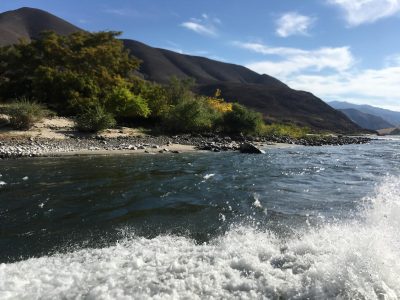
An area scorched by wildfire along the Snake River on the boat trip Thursday afternoon.
More young conservatives acknowledge climate change than ever, said visiting former congressman Bob Inglis.
“But their parents are hard and their grandparents are tougher,” Inglis said.
Inglis, former U.S. Representative of South Carolina, is the executive director of RepublicEn, a conservative organization advocating for legislation to reduce humanity’s contribution to climate change. Inglis spoke to an audience of University of Idaho students, faculty and Moscow community members Wednesday and joined a boat trip on the Snake River Thursday as part of the “EnCourage” 10-week tour of the country.
“Finding collaborative solutions to climate change is pretty essential,” said Matt Dunkle, UI Ph.D student and fresh water ecology researcher. “I care a lot about science, but science on its own doesn’t solve problems. I think (Inglis) has some really cool ideas.”
This summer, Dunkle began conducting National Science Foundation-funded research in Alaska on the effects of glacier melt on stream ecology. He said his research will focus on how fish adapt to changes in the resources available to them.
Alaska’s landscape provides examples of glaciers in every stage of melt, allowing Dunkle to see how some ecosystems have been affected by climate change over time and predict how others, including those in Idaho, will change in the future.
Crystal Kolden, associate professor in the college of natural resources and wildfire researcher, said Idaho is experiencing longer and hotter periods without rainfall, contributing to more and worse fires.
Kolden said sediment and charcoal from fires falls or washes into streams, disrupting their ecosystems.
Tom Lamar, Latah County Commissioner joined Inglis and others on Thursday’s boat trip on the river.
“To me, it’s more important that people understand the science and move forward to do something about it to get results,” Lamar said. “That piece of it is more important than whether we do it through regulation or free market approaches.”
Lamar said he holds a Masters degree in environmental science from Washington State University and sits on the environment committees of the Idaho Association of Counties and the National Association of Counties.
Lamar said he has been executive director of the Palouse-Clearwater Environmental Institute for the last 27 years. He said the institute runs a 26-acre nature center in Moscow that provides environmental education and works on stream restoration.
Lamar said Inglis’s proposed legislation — a border-adjustable carbon tax – sounds good to him.
Inglis said action on climate change has very little to do with the science.
“It’s a theological problem,” Inglis said. “To believe it means we’ve got to change something we’re doing.”
Inglis said his organization is trying to show people it’s an exciting change. He said even if someone believes the science on climate change is false, they should still support a carbon tax. A carbon tax is still a shift away from income tax and would still clean up communities of smog while encouraging sustainable energy sources.
“There are dark places in this world that spawn terrorists because they don’t see a future in their world,” Inglis said. “We can light up the world with more energy and more mobility.”
Nishant Mohan can be reached at [email protected]

